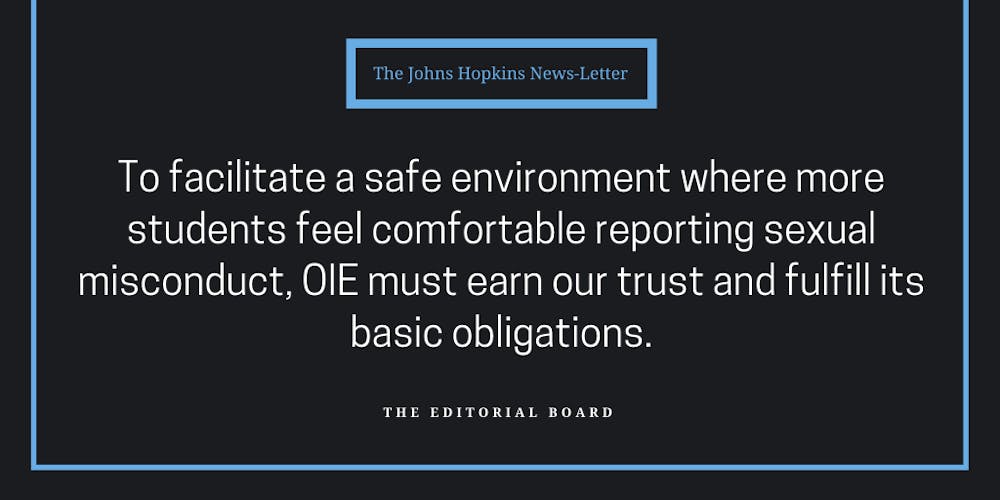Under the pseudonym Zhang, a master’s student at Hopkins recounted the mishandling of her sexual assault case by the Office of Institutional Equity (OIE) to The News-Letter. Unfortunately, OIE has failed yet another complainant in its Title IX procedures.
Assault cases must be investigated in a timely manner that guarantees the safety of the complainant and adheres to established policies. However, Zhang’s investigation lasted nearly three months longer than initially promised. She also alleged that OIE failed to notify leaders of a club, which both the complainant and respondent were involved in, of the investigation.
At the conclusion of the investigation, the perpetrator was found guilty of sexual assault. The resolution panel in charge of determining sanctions, however, did not suspend the perpetrator, instead issuing a punishment that Zhang likened to “a slap on the wrist.” OIE policy states that imposed sanctions will reflect the severity of the misconduct.
We find that the failure to adequately respond to a guilty verdict of sexual assault conflicts not only with OIE’s policy but also common law. We agree with Zhang that this decision sets a dangerous precedent.
“The message I took from this whole process was this: They know he’s guilty, but they’re letting him off the hook because they don’t want to ruin his life. What about the fact that he almost ruined mine?” she said.
And we’ve observed these issues time and time again. The News-Letter has reported on OIE misconduct and the unproductive nature of cases, which have ultimately led to students’ hesitation to report cases. This has been affirmed by the 2019 Campus Climate Survey, where only 55% of students felt confident campus officials would seriously consider a report of sexual misconduct.
Due to the disappointing legacy OIE holds in its investigation practices, Zhang was already hesitant to file her case with the office. We commend Zhang for the courage it took to recount her story.
To facilitate a safe environment where more students feel comfortable reporting sexual misconduct, OIE must earn our trust and fulfill its basic obligations.
While OIE has made efforts to improve its services over the years — particularly after the discovery that the OIE website had mistakenly blocked 18 complaints of sexual misconduct between 2016 and 2018 — it is clear that there is far more work to be done.
OIE’s average investigative time frame for sexual misconduct cases has dropped from 274 days in 2018 down to 172 days in the first half of 2020. However, this is still unacceptable when students are told that investigations generally take between 30 and 90 days.
In fall 2019, University President Ronald J. Daniels told The News-Letter about steps the University had taken to address issues with OIE. However, he also deflected responsibility by stating that student leaders need to be, “as committed to reducing the level of sexual misconduct and sexual assault on campus as the University administration is.”
There are certainly things students can and should do to promote consent culture. We encourage students to attend events during the Sexual Assault Resource Unit (SARU)’s Sex Week to learn more about safe sex and consent.
SARU, a student group that seeks to dismantle rape culture and support survivors of sexual violence, provides a 24/7 peer-run crisis support hotline. In light of Zhang’s experience calling the hotline twice with no response, we hope SARU ensures that situations like this do not happen again in the future.
However, fighting sexual misconduct on campus does not fall solely on the shoulders of students. The University must ensure that OIE can effectively handle the complaints it receives.
OIE has emphasized its efforts to improve efficiency in recent years, but these investigations still take too long. Simply speeding up sexual misconduct proceedings, however, is not the answer.
Survivors deserve to be supported with the time and energy their cases require. We call on the University to hire more staff for OIE, and for OIE to decrease its investigative timeline while also ensuring that thorough investigations are completed.
We recognize that changing these processes takes time, but the University can no longer afford to mishandle the safety of its students.
Leela Gebo, who wrote the piece about how OIE handled Zhang’s case, was not involved in the writing or editing of this editorial.





